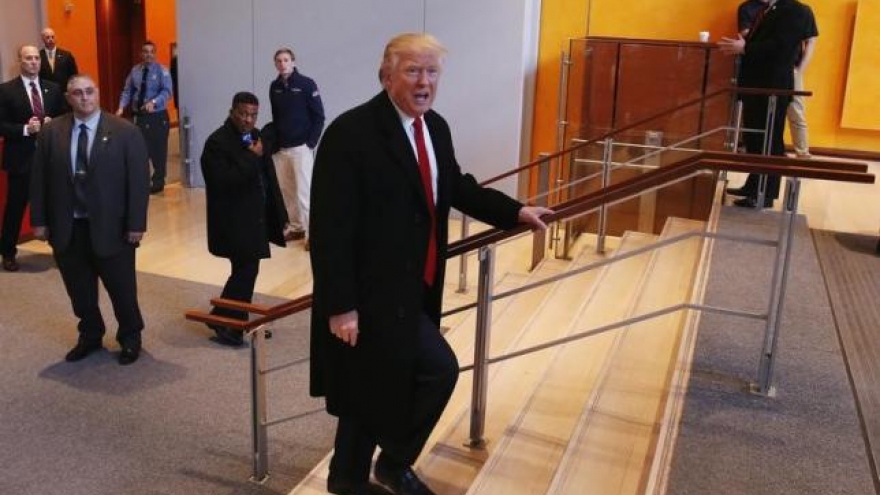Republicans aim to coax Trump toward House trade tax plan
Republicans in the US Congress hope to convince President-elect Donald Trump to support an untested strategy of using the tax code to promote exports while slashing corporate taxes, framing it as a way to fulfill his campaign promises to restore blue-collar jobs.
 |
| U.S. President-elect Donald Trump in Manhattan, New York, U.S., November 9, 2016. REUTERS/Carlo Allegri |
Critics say it risks running afoul of global trade rules and increasing costs for U.S. consumers. Analysts also say that any export gains could be short-lived if the strategy causes the dollar to strengthen, wiping out any price advantage for U.S. products in international markets.
It is likely to undergo months of debate as part of a larger package of proposals offered in congressional Republicans’ “A Better Way” economic plan, but at least one Trump adviser already seems to have a favorable view of the export-focused "border adjustability" strategy.
"If we have a border adjustable tax system, that can solve a lot of these trade issues that Trump is talking about," economic analyst and Trump adviser Stephen Moore said in an interview.
“You’re going to tax what’s imported and not going to tax what’s exported. So we’re going to reduce the trade deficit and we’re going to have more companies come in here,” Moore said.
Border adjustability's details are not clearly explained in a summary of the “A Better Way” plan from House Speaker Paul Ryan and House tax committee chairman Kevin Brady. But the Tax Foundation, a think tank that closely studies business tax policy, said the strategy would be implemented by making revenue from sales to non-U.S. residents non-taxable, while preventing importers from deducting the cost of goods bought from non-residents.
Brady told Reuters that border adjustability would "virtually eliminate" any tax incentive for U.S. companies to move operations overseas and encourage foreign investment to return to the United States.
"We’ve got a great argument, I think,” he said.
Steven Mnuchin, Trump's pick for U.S. Treasury secretary and co-author of the president-elect’s tax plan, described tax reform on November 20 as “something that happens absolutely within the first 90 days of this presidency.” Wilbur Ross, Trump's nominee for commerce secretary, did not mention tax policy directly but said the Trump administration’s aim would be to increase exports in part by getting rid of “non-tariff” barriers.
The perceived winners under a border adjustability approach would include US manufacturers that export heavily, while large-volume importers, such as U.S. retailers, could be hurt. That distinction was already dividing corporate lobbying groups.
While retailers support an overhaul of the tax code, "the tax on imports proposed in the House blueprint is cause for concern for retailers," said Christin Fernandez, spokeswoman for the Retail Industry Leaders Association, a Washington group.
The industry group's members include Wal Mart Stores Inc, Home Depot Inc and Target Corp.
Some version of border adjustability could attract support from Democrats. Senator Ben Cardin, a Maryland Democrat who sits on the Senate Finance Committee and the panel’s tax subcommittee, said he strongly favors the idea. But he called the emerging House plan "very, very questionable" because it would use tax on corporate income rather than a consumption tax.
Tax lawyers and other experts have said such an approach risks violating long-standing world trade rules that allow countries to adjust their trading positions through indirect taxes, such as a sales tax, but not with direct taxes like the U.S. corporate tax. "It would lead to uncertainty on how it would be treated internationally. And that’s bad for business," Cardin told Reuters.
Trump's transition team and other Trump advisors on the economy did not respond to requests for comment.
Brady has said border adjustability would pass muster with the World Trade Organization, which polices global trade. The WTO declined to comment on the plan.




